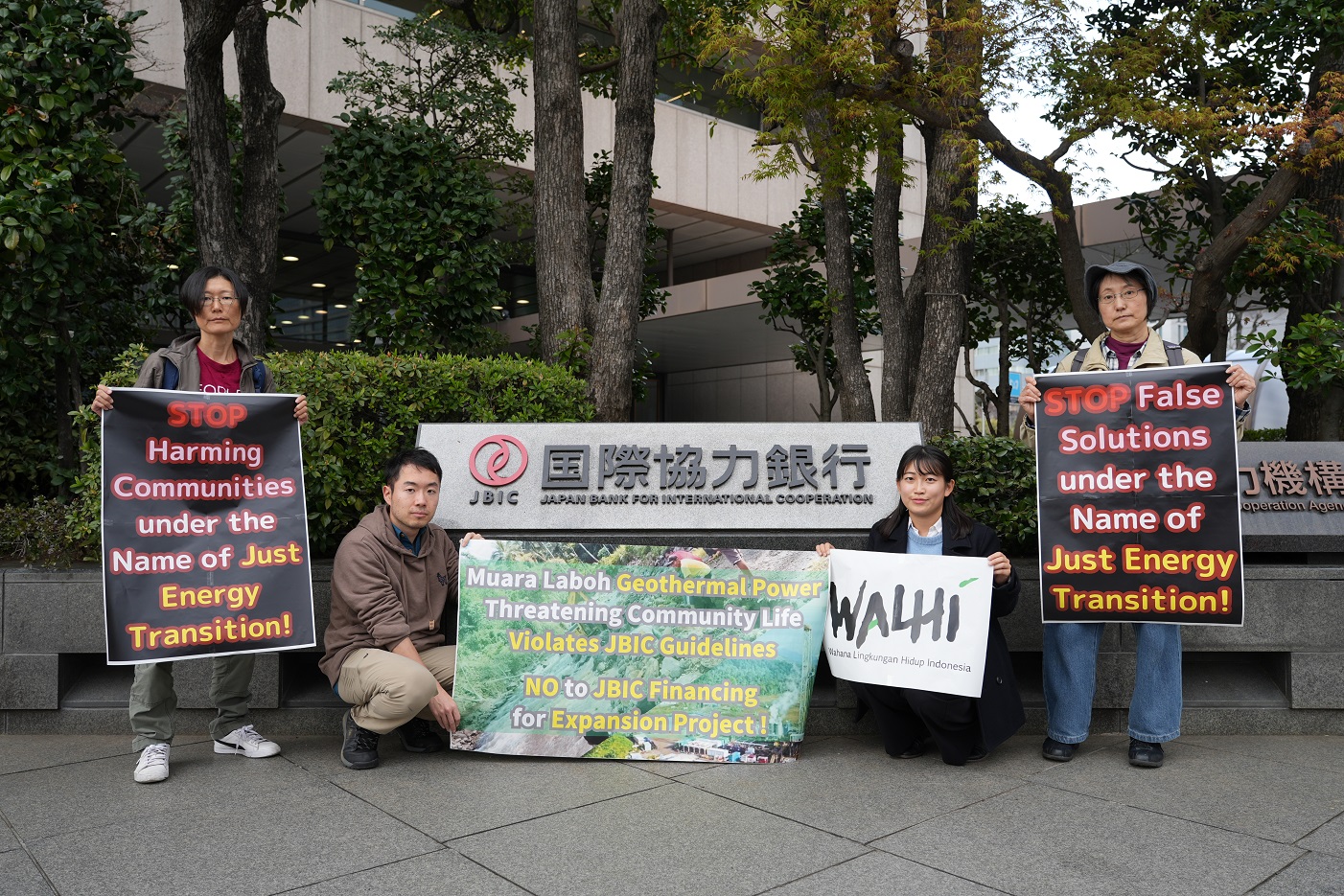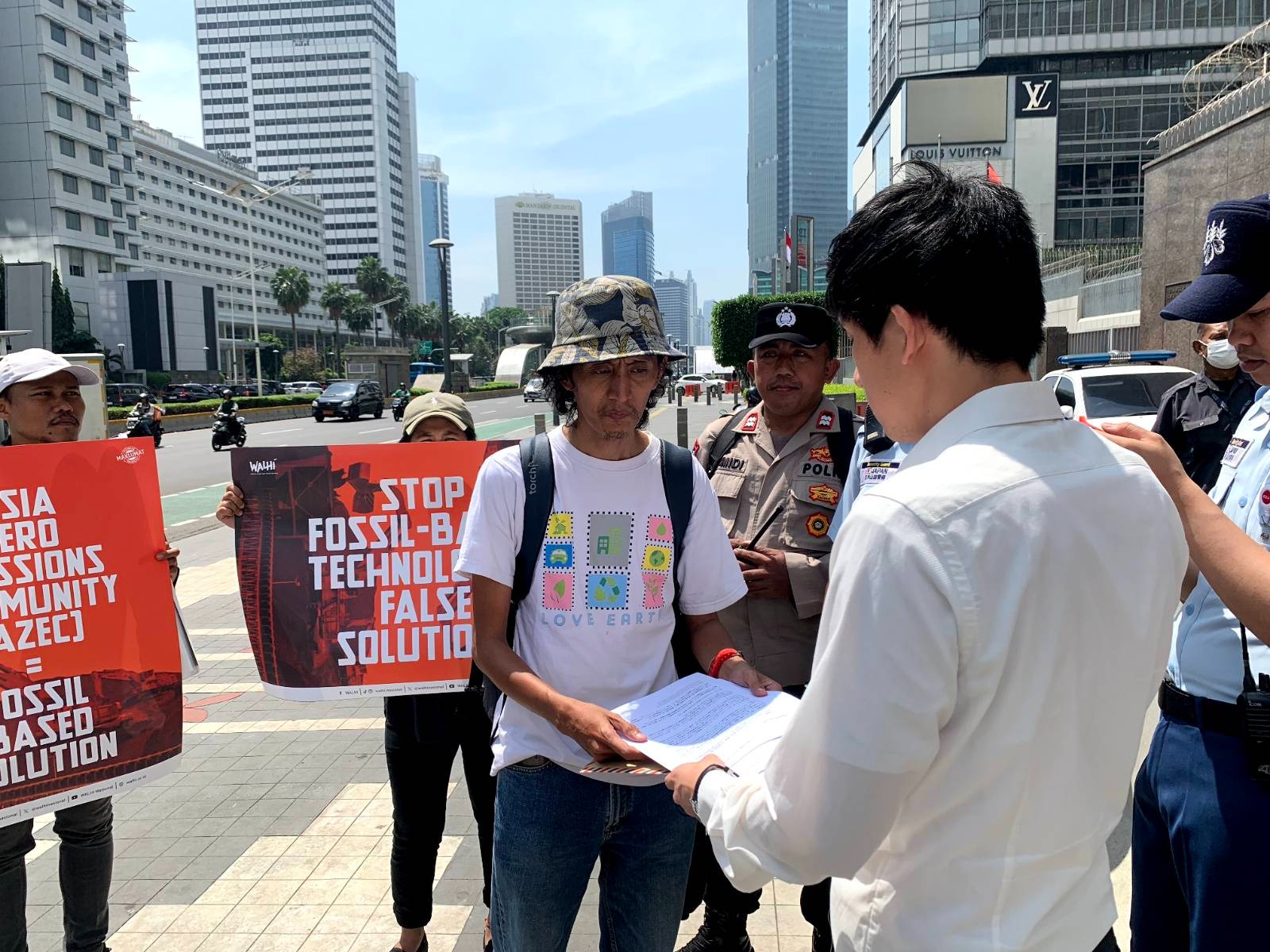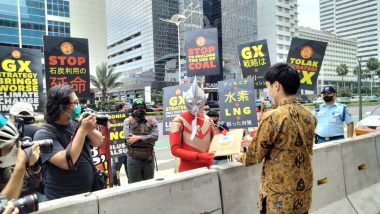Indonesian NGO Urges JBIC and NEXI to Stop Considering Support for Muara Loboh Geothermal Power Expansion Project "Do not support a project that harms the environment and communities and causes human rights violations under the name of a just energy transition!"

On April 3, 2024, the Indonesian Forum for the Environment (WALHI/FoE Indonesia), a local NGO, submitted a petition to the Japan Bank for International Cooperation (JBIC, wholly owned by the Ministry of Finance) and Nippon Export and Investment Insurance (NEXI, wholly owned by the Ministry of Economy, Trade and Industry) regarding the Muara Laboh Geothermal Power Expansion Project in West Sumatra, Indonesia (Muara Laboh Expansion Project), for which each institution is considering its support. The petition points out that the existing project (invested by Sumitomo Corporation and INPEX), to which JBIC and NEXI have already provided support, has caused environmental and social impacts and human rights violations. They are concerned that the expansion plan will exacerbate the existing problems and are calling for both Japanese public institutions to stop considering support for the expansion project.
The Muara Laboh Expansion Project is also one of the many priority projects listed in the Comprehensive Investment and Policy Plan (CIPP) for Indonesia’s Just Energy Transition Partnership (JETP) (JETP, a G7-led framework to support the just energy transition from coal-fired power generation in developing countries), which was released in November 2023. In addition, when Prime Minister Kishida and Indonesian President Joko Widodo met in Tokyo last December, the project was raised as one of the priority projects to be undertaken for the energy transition under the Asian Zero Emission Community (AZEC) concept. The consideration of support for the expansion plan by JBIC and NEXI is precisely what is being done under the name of “energy transition" toward a decarbonized society.
However, according to WALHI’s petition, the following four issues have been pointed out regarding the expansion project;
- both the existing project and the expansion plan do not take into account the forcible and discriminatory land acquisition process that previously occurred in the project. As a result, some farmers have not yet restored their means of livelihood;
- the expansion project may exacerbate the impact on crops due to pollution and reduced water supply;
- The expansion project may exacerbate air pollution due to emissions of gases such as hydrogen sulfide;
- the expansion project may exacerbate flooding impacts due to landscape changes.
JBIC and NEXI have been providing support to the existing project since 2017, but the situation that has occurred at the local site is clearly in violation of the " JBIC Guidelines for Confirmation of Environmental and Social Considerations" and the " the Guidelines on Environmental and Social Considerations in Trade Insurance". In other words, to date, JBIC and NEXI have failed to ensure compliance with the guidelines for this existing project. WALHI has stated that there is no justification for JBIC and NEXI to continue their support for the expansion project under these circumstances, and that JBIC and NEXI must immediately stop considering providing support for the expansion project.
Supporting projects that have significant negative impacts on the environment and the lives of local communities under the name of the just energy transition or AZEC, and a form of support that will result in more debt for many Indonesian citizens who have no historical responsibility to reduce greenhouse gas emissions, is one of the false solutions. The Japanese public and private sectors need to focus more on sustainable energy based on community needs to achieve a rapid, just, and equitable energy transition.
For more information, please see the following petition from WALHI. (Japanese translation is available here) (PDF here)
April 3, 2024
Mr. HAYASHI Nobumitsu, Governor,
Japan Bank for International Cooperation (JBIC)
Mr. KURODA Atsuo, Chairman and CEO,
Nippon Export and Investment Insurance (NEXI)
PETITION: Stop Considering Support for the Muara Laboh Geothermal Power Plant Project Phase 2 at Geothermal Working Area of Liki Pinangawan Muara Laboh, South Solok Regency, West Sumatra Province, Which Could Result in Deteriorating Adverse Impacts on the Environment and Community and Perpetuate Human Rights Violations
We have found that on March 4th, 2024, Japan Bank for International Cooperation (JBIC) through its website disclosed the AMDAL 3rd Amendment for Muara Laboh Geothermal Power Plant Project (PLTP Muara Laboh) Phase 2 at Geothermal Working Area (WKP) of Liki Pinangawan, Muara Laboh, South Solok Regency, West Sumatra Province which is operated by PT. Supreme Energy Muara Laboh (PT. SEML) and is considering providing its loan for this project. We have also found that Nippon Export Investment Insurance (NEXI) uploaded the AMDAL 3rd Amendment for PLTP Muara Laboh Phase 2 on its website on March 11th, 2024, and is considering providing its insurance for the same project. Previously, JBIC and NEXI have provided their financial support for Phase 1 of the PLTP Muara Laboh Project since 2017.
As an environmental organization that has carried out research and advocacy regarding the impacts of developing Geothermal Power Plant projects in Indonesia, we, the Indonesian Forum for the Environment/Wahana Lingkungan Hidup Indonesia (WALHI), would like to convey our objection to JBIC and NEXI’s consideration for supporting PLTP Muara Laboh Phase 2 with the following reasons:
1. PLTP Muara Laboh Phases 1 and 2 have failed to consider the forced and discriminatory land acquisition process that occurred in this project previously.
In 2010, PT SEML began to engage in exploration activities, by forcing the people living in the former PT Peconina Baru HGU (cultivation right) area to leave their rice fields, farmlands, and houses which had never been recognized by the state. The people who live in the former PT Peconina Baru HGU area are descendants of plantation workers since the colonial era as well as migrants from the surrounding area. They have occupied, cared for, and managed this land for more than 20 years. This forced land expropriation caused the community to lose their farms, even though the products from these farms were their main source of livelihood. The research conducted by WALHI has found out that, in the result of the loss of the main income that was previously provided by managing their rice fields and farmlands, the community had no choice but to move away from their original house, because they now have to change their livelihoods to become traders, coolies, or farm laborers and are even forced to get involved in mining and forest logging activities.
The Alam Pauh Duo community has experienced exclusion many times by the state. First, their territory was unilaterally made into a state forest with conservation functions, namely the Kerinci Seblat National Park. Furthermore, through Minister of Environment and Forestry Regulation No. 46/2016 which states that geothermal project is not a mining activity, but is an environmental service, this makes it easier for PT SEML to carry out its operational activities in the Protected Forest Area and Kerinci Seblat National Park. This regulation allows forest clearing and changing the landscape for geothermal mining which disrupts the ecological function of the forest as a support for community life, especially in Nagari Alam Pauah Duo.
The community around the project stated that since the beginning (2010) PT. SEML has never communicated transparently what impacts might occur to society, the company seems to keep many things secret that should be announced. Socialization has not been carried out by involving directly affected communities, but has been carried out through community leaders and traditional stakeholders. Meanwhile, WALHI also received reports that the land acquisition process in 2010-2016 was carried out with pressure and intimidation against the affected communities to accept this project. The community said that local officials and thugs forced farmers to release their land to other parties who will then directly deal with the company in land settlement matters.
PT SEML has failed to ensure meaningful and appropriate participation from the community whose livelihoods have been greatly impacted by the construction and operation of this geothermal project and has also failed to improve their standard of living, income opportunities, and production levels, or at least to restore them to pre-project levels.
2. The PLTP Muara Laboh Phase 2 could worsen the impact of crop failure experienced by the community in the Liki Pinangawan Muara Laboh WKP due to pollution and reduced water supply
PLTP Muara Laboh Phase 1 has caused severe impacts on farmers who depend on the flow of the Bangko Janiah, Bangko Karuah, and Liki rivers for their agriculture. In 2021, 2 years after PT SEML officially started production, most of the farmers around PT SEML, especially in Jorong Kampung Baru Pekonina, Jorong Taratak Tinggi Pekonina, and Jorong Sapan Sari Pekonina, experienced rice harvest failure because irrigation water carried heavy black material, which caused the soil to become very hard so that for a year the agricultural land could not be cultivated.
Geothermal mining operation also requires a very large amount of water, namely 37 liters/second and this can increase to 60 liters/second during pre-production. These needs are met from the same water source that the community uses to meet their needs and for agriculture. After the forest and agricultural area, which previously served as water catchment areas, has been used up, the community, especially farmers, also has to fight over the existing water of the Bangko Janiah River with the company. As a result, many rice fields in Jorong Kampung Baru Pekonina and Jorong Taratak Tinggi Pekonina, which were the community’s main agricultural land, were converted to dry land farming (horticulture) such as shallot and chili pepper plants, or even some were no longer cultivated due to insufficient water to meet the needs of these rice fields.
In 2021, people from Jorong Taratak Tinggi Pekonina who work as farmers came into conflict with PT SEML after discovering that the company was damming and co-opting the water of the Bangko Janiah River. Even though this dam was later dismantled by the company following a conflict with the community, the struggle for water use in the Bangko Janiah River continues because PT SEML still takes water from the Bangko Janiah River, which results in the community having difficulty meeting the water needs for their rice fields.
Based on community’s testimonies, the opening and changes in the landscape at the PLTP Muara Laboh Phase 1 site also resulted in drastic changes in water discharge in the Bangko Janiah River. During the rainy season, the flow of water has become very strong and eroded the walls and bottom of the river, causing the depth of the river to become deeper which in turn makes it difficult for people to channel water from this river to their rice fields. Meanwhile during the dry season, the condition of the river could become dry and no water from the river could be used to meet the water needs of rice fields, which has never occurred before the project.
3. PLTP Muara Laboh Phase 2 could worsen public health and safety problems due to gas concentrations at the Liki Pinangawan Muara Laboh WKP
PLTP Muara Laboh emits 24 ppm of H2S gas during production. This level is enough to have short and long-term negative impacts on public health and environmental damage. H2S gas is very toxic to humans, corrosive, and highly flammable. When burned, H2S gas releases another deadly gas: sulfur dioxide, which has similar symptoms and consequences to exposure to H2S gas. H2S gas can effectively stop the ability to breathe when the lungs absorb the gas. Depending on the levels present, usually at low concentrations, there will be eye irritation, runny nose, and coughing. If the levels increase, the consequences become more severe, with the previously mentioned side effects starting to occur, such as dizziness, nausea, and even death within seconds. The mass of H2S is heavier than air, causing it to spread widely and around the ground surface.
The PLTP Muara Laboh is at high risk of poisoning the environment and society, both short and long-term because agricultural activities and community settlements (Taratak Tinggi and Kampung Baru) around the PLTP Muara Laboh are only 250-500 meters away from geothermal mining activities and power plants. So far, the people who are close to the PT SEML geothermal mine, especially the people of Jorong Taratak Tinggi Pekonina, have felt disturbed by the noise and smell of sulfur around the community’s residential area, and this is more pronounced when it rains. According to the community, the smell of sulfur is predicted to have a greater impact when exploitation activities are carried out on production wells and maintenance of production wells.
The local people reported that shortly after a lot of hot steam was released into the air from the PLTP Muara Laboh, the steam formed clouds and rain or wet mist fell which would damage the crops and plants if it came into contact with them.
4. The PLTP Muara Laboh Phase 2 could worsen the impact of flooding in the Liki Pinangawan Muara Laboh WKP due to changes in the landscape
PT. SEML cleared and converted around 180 hectares of land that was previously forest and community fields (agroforestry). These forests and fields are adjacent to the Kerinci Seblat National Park which supports the lives of the Pauh Duo community and is upstream of several rivers (Bangko Janiah, Liki, and Bangko Karuah Rivers) as a part of the Batanghari Watershed. This change in the landscape has caused damage and reduced the carrying capacity of the environment.
Forests and fields planted with standing crops, such as rubber and coffee, used to be areas that had an important function as water retainers and barriers between community management areas and conservation areas. Fields cultivated with the agroforestry method enable communities to produce economic value while maintaining the ecological function of the area.
After the land was opened and the landscape was changed, the community said that there had been a drastic difference in the fluctuation of river water discharge, which indicated a decrease in the environmental carrying capacity. This decrease in environmental carrying capacity is reflected in increasingly frequent floods and flash floods hitting the downstream areas of the Bangko Janiah, Bangko Karuah, and Liki Rivers. Floods and flash floods often occur in the Jorong Taratak Tinggi Pekonina, Kampung Baru Pekonina, and Pakan Salasa areas.
The results of the Erosion Hazard Level (TBE) calculation from the PLTP Muara Laboh AMDAL show that the project area is an area that has moderate to very high TBE levels. This value shows that this area is very vulnerable and has a high risk of disaster if land clearing and land landscape changes are carried out. However, the development of the PLTP Muara Laboh by PT SEML continues to clear land and change the landscape in the area. As a result, the impacts of decreasing environmental carrying capacity are directly felt by the community around the PLTP Muara Laboh site, making them more vulnerable to crop failure due to floods and droughts, or damage to houses, land, and public facilities due to floods and flash floods.
We are all working towards a rapid, just, and equitable transition away from fossil fuels to renewable energy systems, to limit global temperature rise to less than 1.5 degrees Celsius and achieve global zero emissions by 2050, but we do not want to fall to false solutions in energy transition efforts.
The role of JBIC and NEXI in providing support for mega projects by large corporations that cause environmental damage, harm local communities, and violate community rights, such as the PLTP Muara Laboh, and in financing that originates in debt funds which will add to the burden on our society currently experiencing multiple layers of crises, including the climate one, is not part of the energy transition we seek for.
The geothermal operation in Muara Laboh has proved to cause various negative impacts on the environment and communities as well as human rights violations and worsening the quality of life of communities there. These facts show that the PLTP Muara Laboh Phase 1 has violated the Environmental and Social Guidelines of JBIC/NEXI, and thus, to date, JBIC/NEXI themselves have failed to ensure that PT SEML/PLTP Muara Laboh complies with their Guidelines. Therefore, there is no justification for JBIC/NEXI to continue their support for the PLTP Muara Laboh Phase 2, and JBIC/NEXI must immediately stop considering providing their support for the PLTP Muara Laboh Phase 2 project.
We also urge JBIC/NEXI to ensure that PT. SEML and Indonesian authorities (including police or Indonesian National Military) do not commit any form of retaliation, intimidation, violence or human rights violations against any local community when JBIC/NEXI confirms or investigates the facts described above.
Signatories:
Wahana Lingkungan Hidup Indonesia (WALHI)
Cc:
Mr. KISHIDA Fumio, Prime Minister
Mr. SUZUKI Shunichi, Minister of Finance
Mr. SAITO Ken, Minister of Economy, Trade and Industry
Mr. MASAKI Yasushi, Ambassador of Japan to Indonesia
Mr. Hironori Kamezawa, President & Group CEO, Mitsubishi UFJ Financial Group, Inc.
Mr. Toru Nakashima, President and Group CEO, Sumitomo Mitsui Financial Group, Inc.
Mr. Masahiro Kihara, President & Group CEO, Mizuho Financial Group, Inc.
Mr. Masatsugu Asakawa, President, Asian Development Bank
Contact:
Wahana Lingkungan Hidup Indonesia (WALHI / Friends of the Earth Indonesia)
Address Jln. Tegal Parang Utara No 14, Jakarta Selatan 12790. INDONESIA
email: informasi@walhi.or.id
Tel: +62-21-79193363

